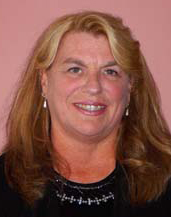
Donna Gallaher, MSN, has been director of the New England AIDS Education Training Center for 25 years. The center’s campaign to promote routine HIV screening features a pin that health care providers can wear to start the conversation with patients.
Experts on the frontlines of HIV prevention believe new federal guidelines calling for routine HIV screening of all adults will help primary care providers dramatically reduce the incidence of new infections.
“We want everyone to know what their status is so they have the opportunity to either get treatment or stay negative,” said Donna Gallagher, MSN, director of the federally funded New England AIDS Education Training Center and an instructor in family medicine & community health. “And if we can find even half the people who don’t know they are positive through routine testing, we can dramatically decrease further new cases they might unknowingly transmit.”
The United States Preventive Services Task Force now recommends that everyone aged 15 to 65 be screened for HIV as part of their regular well and preventive care, expanding its previous recommendation to screen only pregnant women and those deemed to be at an increased risk for HIV infection.
“For years, we asked people risk questions before we tested them,” Gallagher said. “Then we found out we were still missing people who were never tested because they never said yes to one of the risk questions.”
Although there is no cure, the Task Force found that treating people with HIV earlier can not only reduce their risk of developing AIDS and delay its onset, but also decrease the chance that they will pass on the infection to someone else. That’s critically important because about 75 percent of those found to be HIV-positive were unaware they carried the virus. Treating pregnant women also reduces the chances that the virus will be transmitted to their babies.
“With the push to make sure every pregnant woman is tested and gets treatment, we’re expecting to see a year without any new pediatric cases in the very near future,” said Gallagher, a nurse practitioner who has directed New England AIDS Education Training Center since its establishment in 1988 and has been treating infected patients since the earliest days of the AIDS epidemic.
These strides have not been achieved without pushback, however, and it is the pushback from providers, not patients, that has most delayed universal acceptance of routine HIV testing, according to Gallagher.
“So when I teach providers about this, I tell them that HIV status is an important piece of information to have when you’re working with patients to help them make mindful decisions about prevention,” she said.
As part of its campaign to encourage primary care providers to offer HIV screening to all their patients, the AIDs training center has created and distributes pins for providers to wear at work that read, “I got tested. How about you?”
“We’ve been on a major mission to get providers to buy in to the fact that this could be their best way to contribute toward the goal of reaching zero new cases,” Gallagher said. “At the same time that you’re giving someone an opportunity for a longer life, you’re also decreasing the chance someone else will get it.”
Established in 1988 and continuously funded by the Health Resources Service Administration since, the AIDS training center provides knowledge and skills to nurses, nurse practitioners, physicians, physician assistants, social workers, dentists and other health care providers who care for individuals living with HIV/AIDS, and who are on the front lines of prevention efforts. Reflecting on what she celebrated when the organization recognized its 25th anniversary on May 9, Gallagher said, “We are at a point where, because of the ability to test and find people who are positive and provide treatment, we can actually say out loud that we think we’ll soon have a year without any new HIV cases in the United States.”